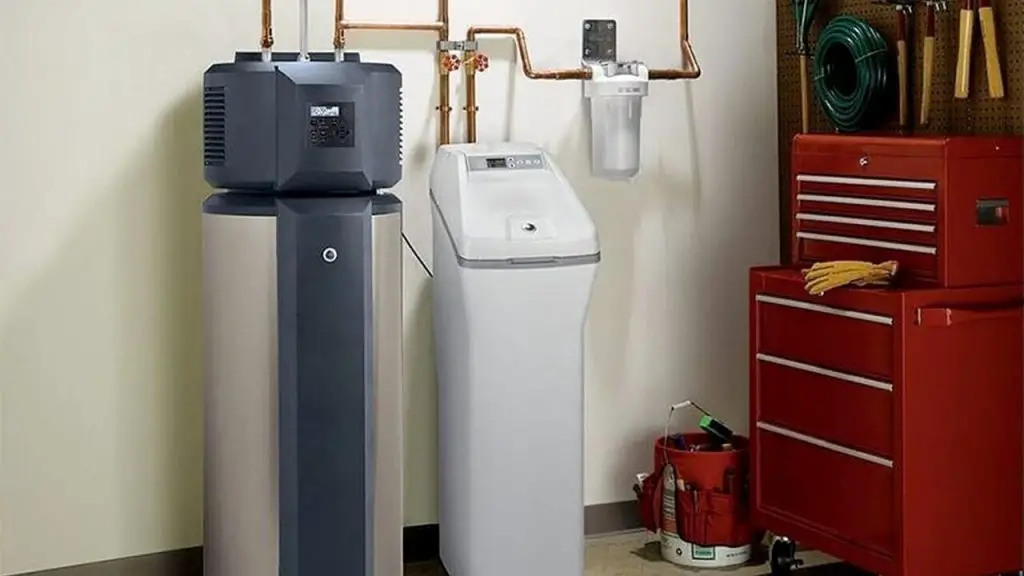A water softener is a device that is used to remove hard minerals from your water. These hard minerals can cause problems with your plumbing, appliances, and even your skin.
A water softener can help to improve the quality of your water and keep your home running smoothly.
If you are interested in learning more about how a water softener works or the benefits of having one in your home, read on!
What does a water softener do?

A water softener is a device that is used to remove minerals from hard water. Hard water contains high levels of calcium, magnesium, and other minerals that can deposit on surfaces and reduce the effectiveness of soap.
A water softener removes these minerals through a process known as ion exchange, in which the hard water ions are exchanged for sodium ions.
This process effectively removes the mineral deposits from the water, making it softer and easier to use.
In addition to improving the quality of the water, a water softener can also extend the lifespan of appliances and plumbing fixtures by preventing mineral buildup.
As a result, a water softener is an essential appliance for any home with hard water.
How does a water softener work?
A water softener is a device that is used to remove hardness minerals from water. The most common hardness minerals are calcium and magnesium.
Water softeners work by exchanging the hardness minerals for sodium or potassium ions. This process is known as ion exchange.
The ion exchange process happens inside a water softener tank that contains small polystyrene beads. These beads have a strong affinity for hard minerals.
As hard water passes through the beads, the hardness minerals are attracted to the beads and become attached to them.
At the same time, sodium or potassium ions are released into the water. Once all of the beads in the tank are saturated with hardness minerals, the water softener will go through a regeneration cycle.
During regeneration, salt or potassium chloride is added to the tank, and the beads are flushed with fresh water. This flushing removes the hardness minerals from the beads and replaces them with sodium or potassium ions.
The softened water is then available for use. Water softeners are typically installed at the point of entry of a home’s water supply. This way, all of the incoming water is softened.
Benefits of having a water softener in your home or office building
As any building owner knows, water is essential for maintaining a healthy and functional property.
Not only does it provide a vital source of hydration for residents and employees, but it is also necessary for flushing toilets, running appliances, and keeping the landscape lush and green.
However, water can also be a source of problems. Hard water, for example, contains high levels of minerals that can clog pipes and damage fixtures. Fortunately, there is a solution: water softeners.
Water softeners work by removing these minerals from the water supply, providing a number of benefits for buildings and their occupants.
Softened water is easier on plumbing, meaning that pipes are less likely to become clogged over time.
In addition, softened water can extend the life of appliances by preventing mineral build-up in their inner workings.
Finally, softened water can make it easier to keep landscapes looking their best by preventing mineral deposits on plants and grass.
As a result, water softeners provide an essential service for any property that relies on hard water.
Factors to consider while buying a water softener
While you may not give it much thought, the water that comes out of your faucets can have a big impact on your daily life.
Hard water, for example, can cause scale build-up in your pipes and appliances, making them less efficient and more likely to break down. It can also make your skin and hair feel dry and brittle.
If you live in an area with hard water, you may want to consider investing in a water softener.
Water softeners work by exchanging magnesium and calcium ions for sodium ions. This process helps to extend the life of your plumbing and reduce the amount of soap required for cleaning.
When shopping for a water softener, there are a few factors to keep in mind. The first is the type of water softener best suited for your needs.
There are three main types of water softeners: ion exchange, reverse osmosis, and magnetic. Each has its own advantages and disadvantages, so you’ll need to decide which is best for your situation.
The second factor is the size of the unit. Water softeners come in a variety of sizes, so you’ll need to choose one that’s appropriate for the amount of water you use.
The third factor is the cost. Water softeners can range in price from a few hundred dollars to several thousand, so you’ll need to decide how much you’re willing to spend.
By taking these factors into account, you can be sure to choose the best water softener for your needs.
How much does a water softener cost?
A water softener is an appliance that is typically used in households to soften hard water. Hard water contains high levels of dissolved minerals, such as calcium and magnesium.
These minerals can cause a variety of problems, including clogged pipes, spots on dishes and clothing, and dry skin. A water softener works by exchanging the minerals in hard water for sodium ions. This process is known as ion exchange.
As a result, the hard water is softened and its mineral content is reduced. Water softeners typically cost between $400 and $600. The price will vary depending on the size of the unit and the features it offers.
Installation costs are usually additional. However, many homeowners feel that the benefits of softened water outweigh the initial investment.
How often do you need to service your water softener?
Most water softeners need to be serviced every few months. This involves adding salt to the unit and occasionally cleaning the mineral tank. Many modern units have self-cleaning features that make this process even easier.
However, it’s still important to keep an eye on the salt level and make sure that the unit is operating efficiently. If you notice that your water softener isn’t working as well as it should, it’s probably time for a service.
By getting your water softener serviced on a regular basis, you can help prolong its lifespan and ensure that it continues to work effectively.
Additional Contents


